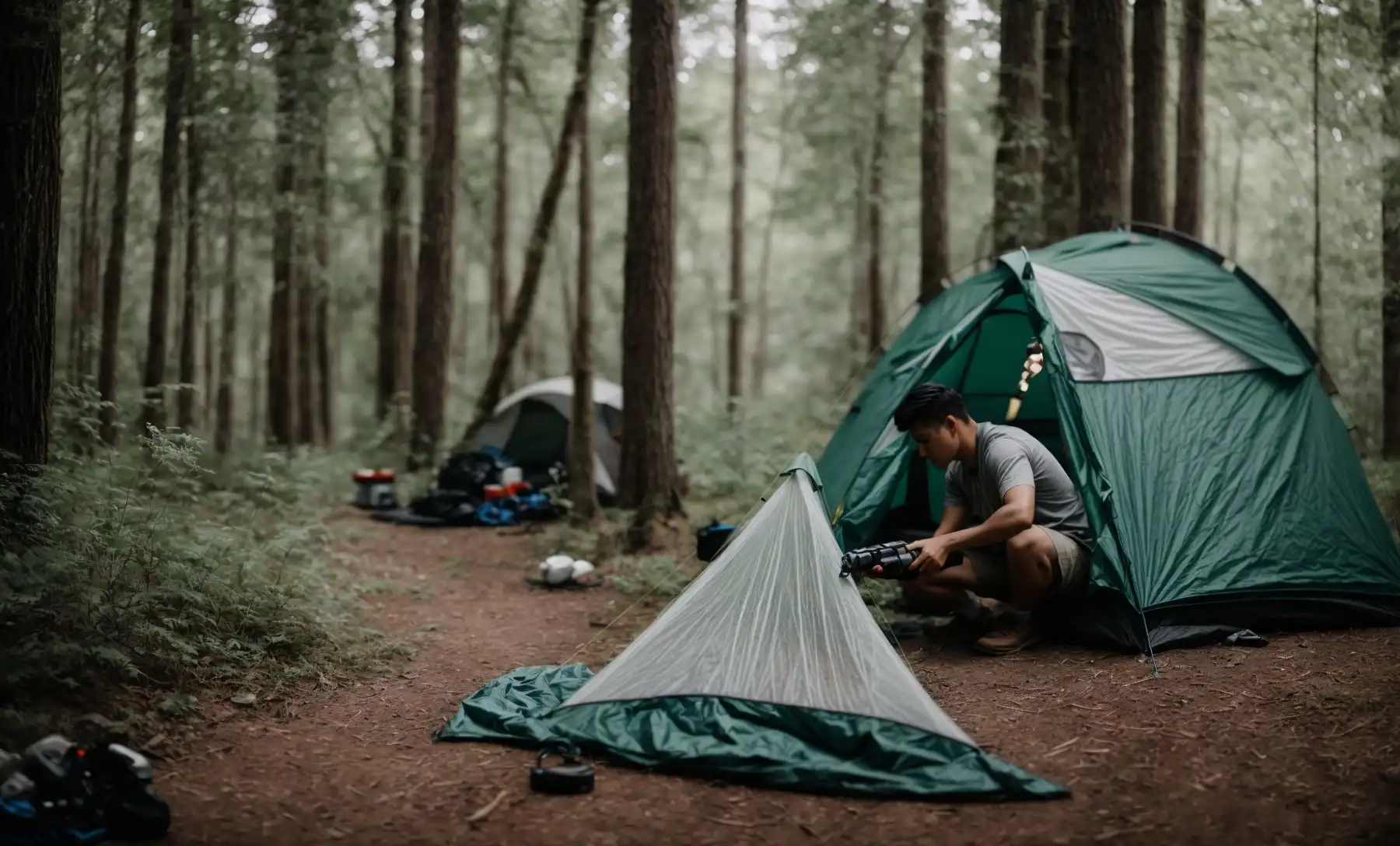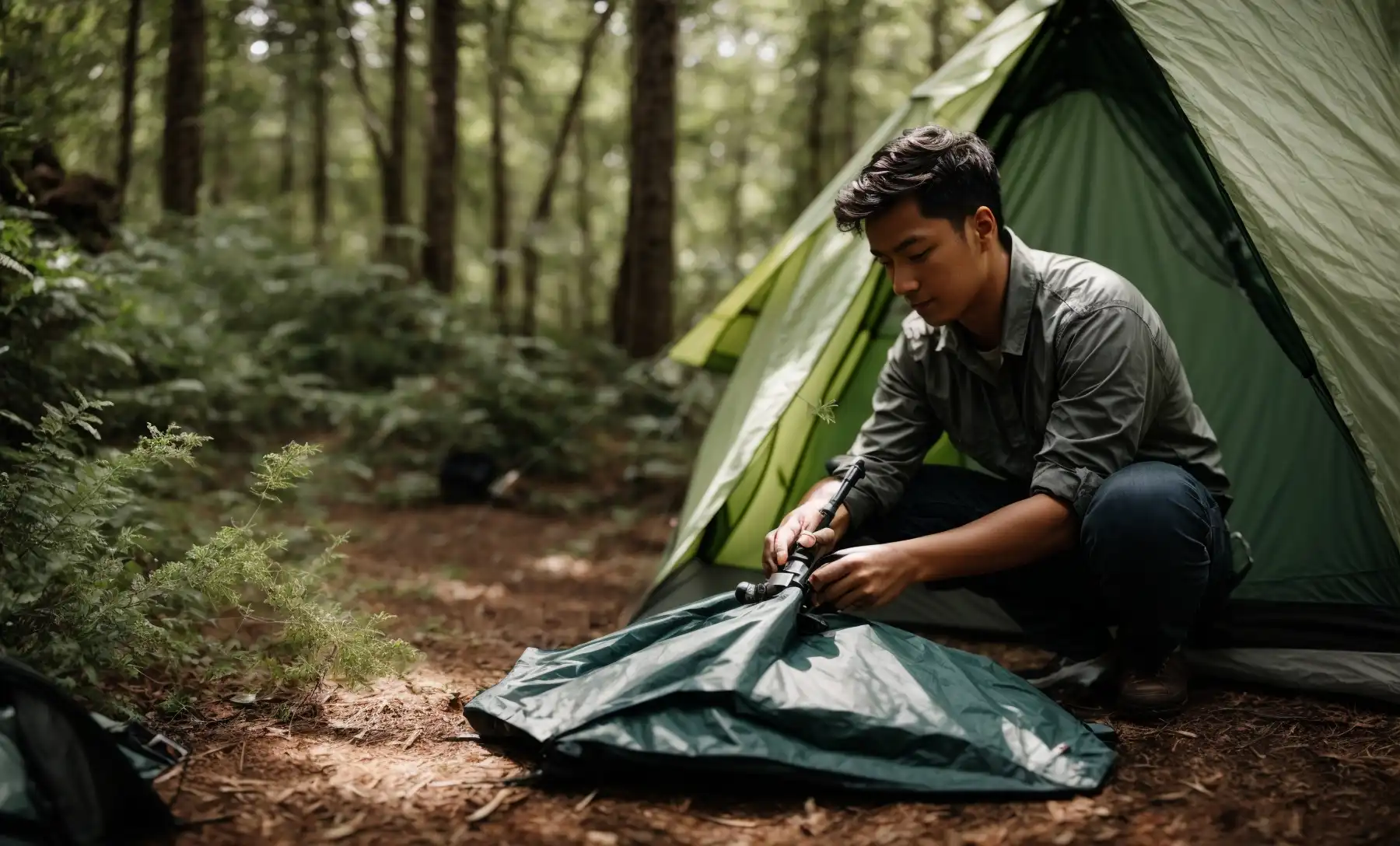To remove bugs from your tent, shake it out vigorously and use a handheld vacuum. Opt for natural repellents like citronella to prevent their return.
Setting up camp often goes hand-in-hand with uninvited insect guests. A bug-free tent ensures a peaceful and enjoyable camping experience. Outdoors enthusiasts frequently encounter the challenge of keeping their temporary homes pest-free. Clearing your tent of bugs is essential, not just for comfort but also for health, as some insects can be carriers of diseases.
By employing simple preventative measures and having the right tools at hand, you can create an insect-free zone and enjoy the great outdoors without the nuisance of creepy crawlies. Keep reading to discover practical steps to maintain a bug-free tent, from preparation to effective natural deterrents.
About Tent Pests
Imagine this: You’ve found the perfect camping spot, set up your tent, and are ready to enjoy the great outdoors. However, as night falls, you begin to notice unwelcome guests—tiny critters that have also decided your tent is their new home. This scenario is all too familiar to many campers. Dealing with tent pests can turn a peaceful retreat into a frustrating challenge.
Understanding the types of pests that can invade and knowing how to keep your sanctuary bug-free are important steps in ensuring a comfortable, enjoyable camping experience.
Tent pests can range from the annoying to the downright harmful. Here’s a quick rundown of the usual culprits:
- Mosquitoes – Known for their pesky bites and buzzing.
- Ants – They can quickly take over a tent in search of food.
- Flies – Attracted to food and waste, they are a nuisance.
- Spiders – While often harmless, they can be unsettling to many campers.
- Small rodents – Mice or squirrels may seek shelter in or around a tent.
These pests are not only annoying but can also pose risks to your health and the integrity of your camping gear.

It’s essential to maintain a pest-free tent for several reasons:
- Comfort – No one enjoys spending their time swatting away bugs or waking up to bites.
- Safety – Some pests can carry diseases or cause allergic reactions.
- Food protection – Pests can contaminate your food supply if not properly secured.
- Equipment longevity – Insects and rodents can damage your gear, creating holes and tears.
Prevention and preparedness are your best defenses against these pests. In the next sections, discover strategic methods to safeguard your tent and enjoy an uninterrupted outdoor adventure.
Preventive Measures: Before and During Camping
In the spirit of the great outdoors and the enjoyment of nature, one aspect of camping that can quickly dampen the experience is unwelcome insect visitors in your tent. Taking proactive steps before and during your camping trip can help keep these critters at bay and ensure a peaceful, bug-free environment. From selecting the ideal camping site to intelligent food management, these preventive measures are essential for a comfortable adventure.
Choosing the Right Camping Site
Scouting the perfect spot to pitch your tent is the first line of defense against bugs. Look out for a site that’s:
- Well-drained and not in a low-lying area to avoid pooling water, which attracts mosquitoes.
- Away from dense shrubs or stagnant water sources; these areas are prolific breeding grounds for insects.
- Preferably with a gentle breeze which can deter flying pests.
- Elevated or on a slight incline to prevent any insects from easily making their way inside.
Proper Tent Setup and Maintenance
Once you have chosen a site, the next step is ensuring your tent is up to the task of providing a barrier against bugs. Make your tent a bug-resistant fortress by:
- Inspecting your tent before the trip for any tears or holes in the mesh or fabric and repairing them promptly.
- Ensuring the tent’s zip is always fully closed when not in use, even during the day.
- Setting up your tent with the entrance facing away from any light source at night as light attracts many types of insects.
- Using a groundsheet to prevent bugs from entering through the ground.
Regular tent maintenance, such as clearing away nearby foliage and keeping the interior clean, is also key to avoiding unwelcome guests.
Smart Food Storage and Handling Practices
One of the best ways to keep bugs out of your tent is to ensure that food and food odors are managed effectively. Implement these strategies for food safety:
| Practice | Rationale |
|---|---|
| Using airtight containers for food storage | Seals out scents that can attract insects. |
| Keeping food and eating areas away from sleeping quarters | Creates a clear boundary that bugs associate with food sources. |
| Cleaning up spills and crumbs immediately | Eliminates potential food interest for bugs. |
| Disposing of garbage regularly in sealed bags | Minimizes odors that can lure a variety of insects. |
Eating inside the tent should be avoided entirely, as even small food particles can attract ants, flies, and other pests.
Active Pest Control Tactics
Embarking on a camping trip comes with the inevitable encounter with the great outdoors, including the presence of uninvited critters. Bugs can be a nuisance, turning a serene escape into an itch-infested ordeal. Here we discuss Active Pest Control Tactics to keep your tent bug-free and ensure a comfortable, enjoyable camping experience. Arm yourself with knowledge and the right tools, and you’ll be well on your way to maintaining a pest-free perimeter.
Natural Remedies and Repellents
Nature has its own arsenal of bug deterrents that can help keep your tent pest-free:
- Citronella – The oil derived from this plant is known for its insect repelling properties.
- Essential Oils like eucalyptus, tea tree, and peppermint act as natural bug repellents.
- Garlic – Consuming garlic can make you less attractive to insects due to the exuded odors from your pores.
These remedies provide a more environmental and health-conscious approach to keeping pests at bay, perfect for those seeking a chemical-free option.
Chemical Treatments: Safe Usage and Considerations
Chemical repellents can offer a high level of efficacy against a wide range of pests. Always follow these guidelines for safe application:
- Read labels carefully for usage instructions and precautionary advice.
- Apply repellents in well-ventilated areas to avoid inhalation.
- Use just enough to cover exposed skin, avoiding over-application.
- Consider the tent’s material—some chemicals can damage waterproof coatings or fabrics.
Permethrin-based products are popular for treating gear and should never be applied directly to the skin.
Physical Barriers and Traps
Establishing physical defenses can prevent bugs from even considering your tent as a target:
| Barrier/Trap | Description | Placement |
|---|---|---|
| Mesh Screens | Dense nets that block entry of bugs | Windows and doors |
| Adhesive Strips | Sticky traps that catch insects upon contact | Near tent openings |
| Ultrasonic Devices | Emits frequencies that deter pests | Around the campsite |
Moreover, zippers should remain closed, and ground sheets need to be tucked in to fortify your tent against bug intrusions.
What you need to know: How Many Tent Stakes Do I Need
Post-camping Cleanup and Storage
Retreating to the outdoors and spending nights under the stars can be restorative, but returning with a bug-infested tent can quickly dampen the post-camping glow. Proper care doesn’t end when the trip does; it extends to the cleanup and storage of your tent. Ensuring your tent is clean and stored correctly will pay off in longevity and hassle-free outings for years to come.
Cleaning Your Tent After Use
Thoroughly shaking out your tent is the first step, but never underestimate the importance of a deep clean. Subtle remnants of nature lurk within the fibers and can attract unwanted insects if left unattended. Here’s a bulletproof approach:
- Set up your tent in a well-ventilated area.
- Use a gentle, non-detergent soap and a sponge to wipe down surfaces.
- Rinse thoroughly with a hose or clean water to remove all soap residue.
- Air-dry the tent completely before proceeding to storage.
Storing Your Tent to Prevent Future Infestations
Once clean and dry, storing your tent properly is crucial to prevent bugs from taking up residence. Consider these tips:
- Avoid plastic bags and tightly sealed containers. Breathable storage solutions like a cotton sack or a mesh bag prevent moisture buildup which can lead to mold and bug infestations.
- Choose a cool, dry place away from direct sunlight for storage to protect the tent’s material and deter bugs.
- Never store the tent if it’s even slightly damp. Any moisture can attract insects and cause mold or mildew.
Routine Checks and Maintenance Tips
Regular inspections are key to extending the life of your tent and averting bug invasions. Monthly checks are recommended to ensure any issues are caught early. Be proactive with these maintenance tips:
- Inspect for tears or rips that can be inviting to small pests and repair them immediately with appropriate patch kits.
- Refresh the tent’s water and UV-resistant treatments periodically to maintain protective barriers.
- Clean zippers and apply a silicone lubricant to prevent them from sticking, which can create small openings for bugs.
To know more: How to Insulate Tent for Summer
Conclusion
Banishing bugs from your tent is crucial for a peaceful outdoor escape. Employ these strategies for a pest-free zone, nailing your next camping adventure. Remember, prevention is key: keep your tent zipped, use bug repellent, and stay vigilant. Sweet dreams, sans creepy crawlies, await under the stars.
Embrace the wild, bug-free! As the stars light up the night sky, let our Learning section at Outdoor Awaits light up your camping knowledge.
Sukhen is a passionate blogger and traveler who visited many historical places in Bangladesh, Myanmar, India, and Thailand. He’s an avid camper, so he shares his knowledge of camping and wildlife with his readers. He also helps readers plan their own camping trips. To know more, stay connected with Outdoor Awaits.

